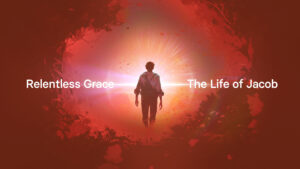Fight Club – Genesis 32:22-32: Reflection Guide
Reflection Guide
Genesis 32:22–32 | Fight Club
Key Terms
Jabbok – A river that flows westward through a cleft in the Jordan Rift Valley mountains and empties into the Jordan. By crossing the Jabbok, Jacob and his family are heading towards Esau, not away. Today the Jabbok is called the Zerqa.
Israel – In this story, Jacob is renamed Israel (v. 28)—which is reiterated in Genesis 35. The meaning of the name Israel isn’t certain but likely has the sense of “God struggles” or “May God struggle.” The name Israel would eventually become the name of the nation formed from Jacob’s family and this is the origin of the name of the modern country, Israel.
Background
After sending a gift ahead to Esau and remaining back in Mahanaim, Jacob decides that same night to pack up and head out across the Jabbok towards Esau (v. 22). Jacob sends his family and all of his possessions across the river, but he decides to stay back himself (v. 23) and this night alone would lead to one of the most significant events in Jacob’s life. All alone, a man wrestled with [Jacob] until the breaking of the day (v. 24). There is some uncertainty as to who exactly Jacob wrestled with during this encounter. In the story this person is only identified as a man, but after the event Jacob says that he has seen God face to face (v. 30). Hosea 12:4, referencing this event, says Jacob strove with the angel—but Hosea 12 as a whole also seems to conflate the “angel” with God (see Hosea 12:2-6). In fact, other OT passages do the same including the famous scene with Moses and the burning bush. In that story in Exodus 3, the writer initially says the angel of the Lord appeared to [Moses] in verse 2 before saying when the LORD saw [Moses] in verse 4. Although introduced as the angel of the Lord, the being who appears to Moses is clearly God himself. In other words, the OT writers sometimes refer to physical appearances of God as appearances of an “angel” and that seems to be what is going on with Jacob. What exactly Jacob saw and touched while he wrestled is unknown, but the story strongly suggests that is was God himself. During their wrestling, Jacob’s hip was put out of joint (v. 25) causing Jacob to limp as he left the place (v. 31). As the sun comes up, Jacob’s opponent asks Jacob his name before renaming him Israel, saying for you have striven with God and with men, and have prevailed (v. 28). When Jacob asks the man for his name, he replies Why is it that you ask my name? and blessed Jacob instead of telling him his name (v. 29). Jacob then—as he’s done several times previously—renames the place Peniel, saying For I have seen God face to face, and yet my life has been delivered.
Did You Know?
The writer mentions Jacob’s eleven children (v. 22) even though Jacob has at least twelve, including his daughter Dinah. It’s likely the author is highlighting the sons because they would become the nation of Israel and this story is the first mention of the name Israel.
Going Deeper
Read 2 Corinthians 12:7-10 How does this passage—along with Genesis 32:22-32—speak about our weaknesses before God? Where do they point us for strength to persevere in the midst of struggle?
Reflection Questions
Learning the Word
1. Read Genesis 32:22-32. What thoughts or feelings do you have as you read about Jacob’s wrestling with God?
2. In verses 22-24, what is the significance of Jacob’s being alone at night without his family and also without his family as he re-enters his homeland? How does this mirror his exit from his homeland when he saw a vision of the stairway to heaven at Bethel (Genesis 28:10-22)?
3. Why do you think God initiated a physical wrestling match with Jacob? Why did God wait until the end to dislocate Jacob’s hip? What spiritual reality was he teaching with this object lesson?
4. In verses 27-29, several important things happen in an exchange of names. First, if God knows everything (and he does), why does he ask Jacob to say his name? Why was this an important confession for Jacob?
5. Why do you think it was necessary for Jacob to have this face-to-face encounter with God before he encountered Esau?
Living the Word
6. Why is it essential for each of us to encounter God personally?
7. After this encounter, Jacob summarizes this experience this way: “I have seen God face to face, and yet my life has been delivered.” What does this story tell us about God’s relentless grace?
8. Have you ever been “overpowered” by God and his grace? What do you think it looks like to grow increasingly aware of your weakness and increasingly aware of the Lord’s strength?
9. Read 2 Corinthians 5:17, Galatians 2:20, Ephesians 4:20-24. What do these verses say about our new identity in Christ? How can we live these verses out this week?
Practice this week: Ask the Lord to show you where you need to confess your own weakness and walk in the new identity God has given you.

